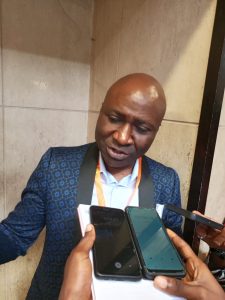Lanre Duyile commends GTCO Autism Conference for Advocacy, Others
- Advocates for more researches, organisations, government, community interventions

Lanre Duyile, a Board-Certified Behaviour Analyst, Adjunct Professor of behaviour analysis, Endicott College, Beverly MA. USA. A Voice Certified Analyst, certified to operate in the US and in Canada registered as a behaviour analyst. He moderated at the 15th edition of the GTCO Autism Conference and spoke in an interview with some selected newsmen including the Editor Gentechnews, Tony Nwakaegho.
Excerpts:
Briefly introduce yourself and what you do?
My name is Lanre Duyile, a Board-Certified Behaviour Analyst, Adjunct Professor of behaviour analysis, Endicott College, Beverly MA. USA.
I am a voice certified analyst, certified to operate in the US and in Canada I am a registered behaviour analyst. I run a company in Ottorino, Canada that provides support to people with mental disabilities. What we do is run programmes for the individuals, especially adults. We also train staff and parents how to support people effectively. We do behaviour consultations and we run homes for people with developmental disorders. We also have a college for post secondary education to professionals who are seeking to work with people with special needs at Toronto Ottorino.
In the 15th year of this conference what can you say are the biggest achievements?
If you listened to the group CEO, you will know that a lot has been achieved, but there are so many questions yet to be answered. Every year, at least I have been coming for the last five years where we have seen 200 families at least. That is at least 200 children and most of them are new people, and we see people coming from other parts of the country for consultations. So, in terms of seeing people, we have seen a lot of people. In terms of creating awareness there is a lot of awareness there. There are still a lot of misconceptions, but we can continue to work hard to make sure that things are getting better. In the case of GTCO and what they are doing, now they are talking of moving from advocacy to action, so they are beginning to talk of what else can we do in addition to what we are currently doing to continue to create awareness and bring back the change that is needed. So, today we are going to hold a panel of discussion where we will be talking about those new things, we just have to see what people will say in order to know what the next steps are.
Before now what have been the challenges in this programme?
Towards this programme, I don’t know because this programme is open and free and people can come as they know about it. It is one thing to have an idea of what autism is all about. The other thing is to be able to access services. The services are not cheap and I don’t know how parents do it here, especially parents, single moms. Even in a two-income household I don’t really know how they can get services because it is expensive to get therapists and to get them to schools. There is a lot that can be done but the resources are non-existence. Government is not playing a role and the community is not playing any role. What is out there is what GTCO is doing and some professionals set up different clinics to provide services, but again it boils down to who can afford those services.
Are there any interventions from foreign donors?
I am not aware of any right now. The United Nations may be able to do something, I don’t know if anything is happening in that space. The professionals that are local may be able to make proposals to those organisations to let them know that they have these people and will need their support, can you provide support?
What is your assessment of this programme and the previous edition?
In the previous edition, what we have done is to continue to see families. Before now, we were just in Nigeria, GTCO is now going to Ghana and I think this year is going to be the third year that they are going to Ghana. We are also thinking about continuing to do some research on what we are doing here. GTCO is getting into gathering the data, analysing the data and being able to use the data to make decisions about where we are going. I think things are moving in the right direction.
Briefly explain your experience with those with autism spectrum disorder at a precious conference?
The conference is about autism spectrum disorder, so if you have ten people going to see a doctor and if ten of them have autism, they will get the same diagnosis. But if you have John and Obi and Sola, three people then the diagnosis is the same but it presents differently. The fact that these guys may have the same diagnosis does not mean that they are the same and will be treated the same. You need to look at each individual, understand how the diagnosis affects them and meet them where they are and not one sight sees it all. You will meet each individual and know what they are experiencing and figure out how it will be solved.
